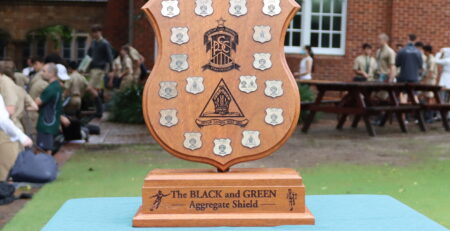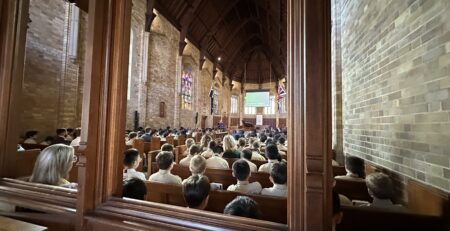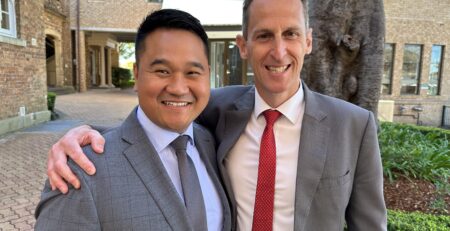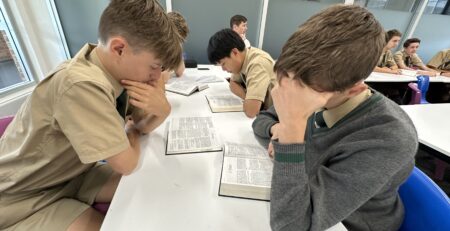From the Head Master
In recent weeks there have been a number of stories in the mainstream media that ‘expose’ the poor behaviour of boys in schools like Trinity.
These stories provoke a range of responses in me. Often there is revulsion at the abhorrence of some of the behaviour and attitudes that are described.
Often I am despondent at the revelation that, despite all the efforts of schools like ours to cultivate respectful behaviour, disrespect continues to resurface.
Often I am bemused at the fact that some students remain oblivious about the perils of their digital footprint, despite comprehensive education about the need for caution and restraint.
Often I am frustrated by the speedy glee with which people misuse stories of this sort as ammunition to pursue a range of hostile agendas against our schools, as though the same issues are not to be found elsewhere.
Often I am saddened that the reputation and character of the many are tarnished by the actions of the few.
However, I am never surprised. I am never surprised to ‘discover’ that some students have done some dumb or inappropriate things. Of course they have! In the complex process of growing from adolescence to adulthood, caught in the turbulent tumult of influences ranging from family of origin, popular culture, hormonal and physiological change, peer groups and life experiences, trying to make sense of the world around them and inside them, working out identity and purpose and meaning, dumb and inappropriate things are done. Furthermore, we know that the fallen nature of humanity pre-disposes all of us to self-centredness in its multiple forms, some of which emerge in repulsive behaviours.
This is not in any way to excuse poor behaviour. Our School (and others like it) have values and expectations that are communicated to the boys constantly. They know what is expected of them and they know that, when they fall short, there will be consequences. To observe that transgressions are inevitable is not to say that they are permissible or endorsed. Rather, it is to highlight the need for a school to have clear, consistent and wise processes to manage poor behaviour as and when it happens.
Dealing appropriately with incidents of poor behaviour is not always straightforward. Understanding the incident and the context is crucial; investigation can take some time. Fairness is necessary, as is proportionality. Deterrence and restoration are both important. Deterrence is both individual (“I won’t do that again”) and general (“I won’t do what he did!”). Restoration of relationships and to the community is the desired endpoint, although there must always be a recognition that some behaviour may make ongoing enrolment untenable, either for the sake of the transgressor or for others in the community.
The complexities abound. Due process demands time, but too much time is problematic. The wellbeing and dignity of the individuals involved requires confidentiality, particularly when dealing with children and young people. However, rumours and gossip can misrepresent a situation, which may need to be corrected. The perspectives of the stakeholders also vary; my observation is that people are very quick to call for justice, until they have skin in the game, in which case mercy is the best way forward. The good of the individual sometimes sits in tension with the good of the community. As a Christian school, we also have to consider the place of forgiveness and redemption.
The process is complicated further by commentary from those who are not involved. The reality is that very few people are in a position to see all the pieces of the puzzle – and they are the people who are attempting to manage the situation, not the people standing on the sidelines.
From time to time, comment will be made to the effect that schools are hiding something or attempting to cover something up. I make three observations. First, a school may sometimes be required by external authorities such as the Police or the Department of Communities and Justice to pause or to stay quiet on disciplinary matters. Second, as mentioned above, confidentiality may be in the best interests of the parties involved; ‘wanting to know’ is not the same as ‘needing to know’. Third, it is very rare that all the facts of a situation are able to be disclosed; ideally, the members of a school community will have formed a level of trust in the institution, based on experience over time, which enables them to accept that the School is making good decisions. A huge number of pastoral and disciplinary matters are dealt with at various levels in the School every term; the fact that these are not enumerated to the community as a whole is not a cover-up.
All of which is to say, the challenges we face in aiming to grow good men are real! I appreciate the trust that the Trinity community generally shows in the School’s processes and the senior pastoral staff. I have no doubt that, somewhere along the way, it will be our turn to be in the spotlight. When that time comes, I hope and pray we will have the integrity to manage the situation in the best interests of the boys and the community, that we will have the humility to reflect honestly on who we are and what we are doing, and that we will be able to find a way forward that strengthens both our mission and the community’s confidence in the School.
Detur gloria soli Deo
Tim Bowden | Head Master
















